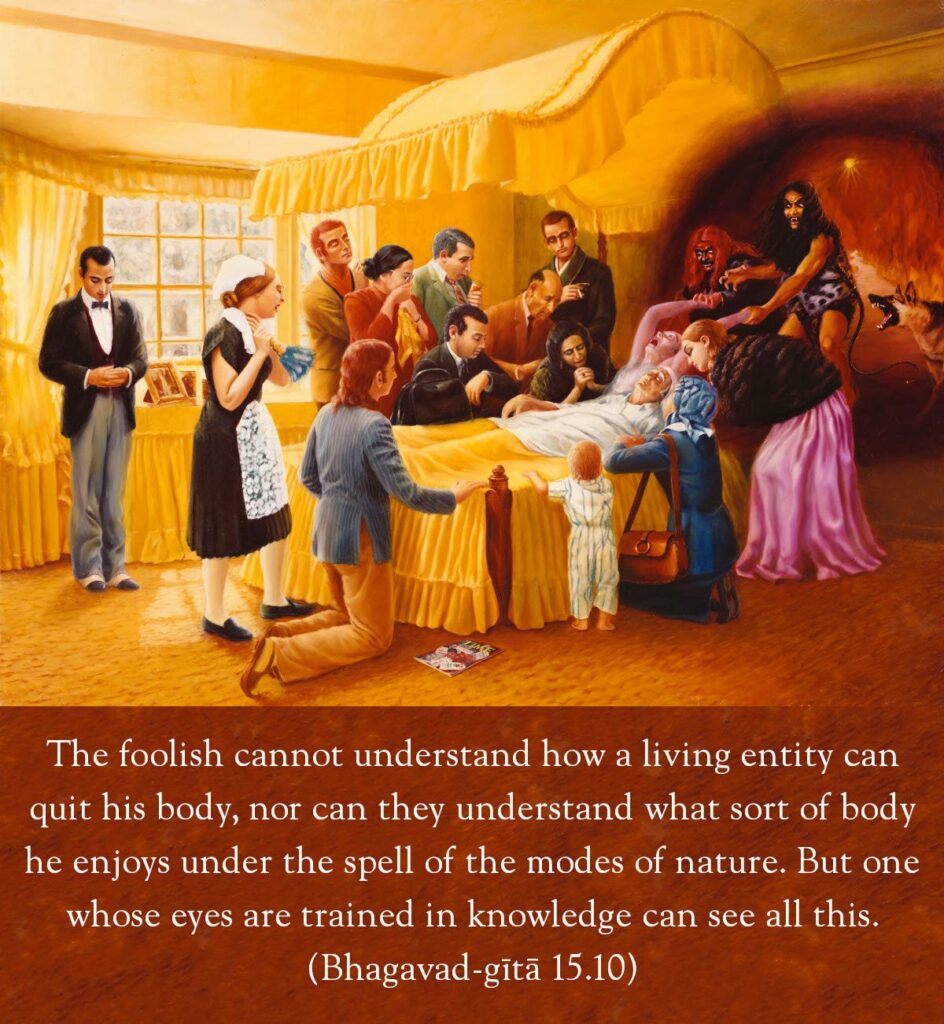उत्क्रामन्तं स्थितं वापि भुञ्जानं वा गुणान्वितम् |
विमूढा नानुपश्यन्ति पश्यन्ति ज्ञानचक्षुष: || 10||
utkrāmantaṁ sthitaṁ vāpi bhuñjānaṁ vā guṇānvitam
vimūḍhā nānupaśhyanti paśhyanti jñāna-chakṣhuṣhaḥ
utkrāmantam—departing; sthitam—residing; vā api—or even; bhuñjānam—enjoys; vā—or; guṇa-anvitam—under the spell of the modes of material nature; vimūḍhāḥ—the ignorant; na—not; anupaśhyanti—percieve; paśhyanti—behold; jñāna-chakṣhuṣhaḥ—those who possess the eyes of knowledge
Translation:
The deluded do not perceive him when he departs from the body or dwells in it, when he experiences objects or is united with the gunas; but they who have the eye of wisdom perceive him.
Commentary:
‘Why do we not see the Lord?’ – This question is asked by many. The Lord answers it. You can see the Lord now in the body by acquiring the eye of knowledge’ One need not go far and search for Him here and there. In his very body tenanted by the jiva, who is eating, drinking sleeping, acting, enjoying and suffering, that Paramatman can be seen by right discrimination which opens the eye of knowledge (Jnanachakshushah). On account of the dominating of the objective phenomena, the deluded are not able to see Him. If he turns the mind outside, the world is reflected in it; If he turns it inside God is realised. If the mirror is turned to us, we see ourselves. If it is turned outside, the whole of the phenomenal world is seen. If the mind is turned within, kept calm, pure and firm, Atma is beheld. This Atma is seen only by such sages who can discriminate between the real and the unreal, the seer and the seen. (Seeing the Atma means, self-realisation.)
Utkramantam: The jivatma enjoys in one body and after discarding it takes up another and so on he migrates from body to body. It is clear that the seekers need to look into themselves to find the Lord there even in this body.
The first duty of man is to know who he is, what his true nature is, how he is dwelling in the body, and what he is doing with the sense-organs and the mind. This is the search for the Lord, through discrimination and dispassion. The externalised mind which is beholding any other thing except the seer, should turn its concentrated look at the seer Himeself ‘the Lord.’ Thus the true nature of the real man within is known. Knowledge is the light by which all things are seen clearly. The Lord is thus seen and realised with the eye of knowledge. The jiva then knows that he is Parmatma, the Lord.
Related Bhagavad Gita Verses:
- On those who are ever devoted to Me and worship Me with love, I bestow the yoga of understanding, by which they come to Me. (10.10)
- Behold here today, O Guḍākeśha, the whole universe, of the moving and the unmoving, and whatever else you desire to see, all concentrated in My body. (11.7)
- But with these eyes of yours you cannot see Me. I give you a divine eye; behold, now, My sovereign yoga-power. (11.8)
Question: Who can see Paramatma, and who cannot?
Answer: Those who possess the eye of knowledge behold Him, the ignorant do not. (The eye of knowledge means right discrimination between Atma and Anatma.)
Bhagavad Gita: Chapter 15 🔻 (20 Verses)
